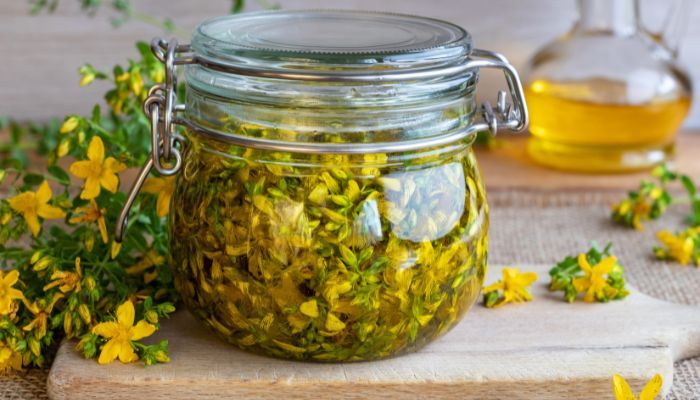St. John's Wort is a plant native to Europe with yellow, star-shaped flowers. The benefits of St. John's wort are many. It is often used for depression and a number of other illnesses and conditions. That is what you will find in this article onBiopedia.
Despite the range of benefits of St John's Wort, it is a very powerful natural remedy and should only be consumed in correct doses, according to following precise directions and with caution because it can cause serious interactions with certain medications.
St John's wort is named after John the Baptist in English speaking countries. The plant usually begins to flower around June 24, the day of St. John the Baptist. It contains many chemicals that act on neurons in the brain that regulate mood.

Let this article teach you more about the main benefits of St. John's wort and when its consumption can be dangerous and is contraindicated.
Benefits of St. John's Wort
St. John's wort is believed to improve mood and relieve depression, but it is unclear exactly how it works. Perhaps its secret lies in the effect that St John's wort has on the brain.
Researchers suspect that ingredients in the herb (hypericin and hyperforin) may increase levels of certain brain chemicals, such as serotonin. People with depression often have low levels of serotonin and other neurotransmitters.

One reason people prefer St. John's wort (as opposed to antidepressants, which can raise serotonin) is that it has fewer side effects than medications.
The herb is also commonly applied to the following health problems:
- Anxiety
- Symptoms associated with menopause
- Premenstrual syndrome (PMS)
- Seasonal affective disorder (SAD)
- Smoking cessation
- Viral infections
St John's wort may also be beneficial for the skin. St. John's wort oil is used topically to heal wounds and various other skin conditions such as eczema and hemorrhoids.
In what conditions can it be effective
As previously mentioned, one of the main benefits of St. John's wort is for conditions of mild to moderate depression, but this powerful herb can be extremely helpful and effective for a number of other ailments and health conditions.
Other uses include its consumption for heart palpitations, mood swings, and other menopausal symptoms, mental disorders that exhibit physical symptoms including premenstrual syndrome (PMS), attention deficit hyperactivity disorder (ADHD), obsessive-compulsive disorder (OCD), social phobia, and seasonal affective disorder.

St. John's Wort is also often mentioned and consumed to help quit smoking, for fibromyalgia, chronic fatigue syndrome (CFS), burning sensation in the mouth, migraines and other types of headaches, muscle aches, nerve pain and nerve damage throughout the body, pain that travels down the sciatic nerve in the leg, and irritable bowel syndrome.
It is also used for cancer (including brain cancer), HIV/AIDS, hepatitis C, herpes simplex, to aid in a procedure to unclog blocked arteries, weight loss, and to treat a disease that causes loss of skin color.
As you can ascertain, this is an herb with extremely many and varied uses.
Despite the irrefutable amount of benefits of St. John's Wort, its potency should not be underestimated, so it is best and safest to consume it only after consulting a medical professional or a professional homeopath and following the exact amounts that are prescribed to you.
Benefits of St. John's wort - how does it help?
For a long time, researchers believed that a chemical in St John's wort called hypericin was responsible for its effects against depression.

Newer information suggests that in fact another chemical found in the plant - hyperforin - as well as adhyperforin, and several other similar chemicals may play a larger role in depression.
Hyperforin and adhyperforin act on chemical messengers in the nervous system that regulate mood.
Benefits of St. John's wort - are there side effects?
St John's wort is considered safe when taken orally for up to 12 weeks. Some evidence suggests it can be used safely for more than a year.
It may cause some side effects such as sleep problems, vivid dreams, restlessness, anxiety, irritability, upset stomach, fatigue, dry mouth, dizziness, headache, skin rash, diarrhea, and numbness.
Take St. John's wort in the morning, or reduce the dose if it seems to be causing sleep problems in your case.
St John's wort is not safe when taken by mouth in large doses. When taken by mouth in large doses, it can cause severe reactions when exposed to the sun. Wear sunscreen outside, especially if you have fair skin.
St John's wort interacts with many medicines. Tell your doctor if you want to take St. John's wort.
You will usually find more information in these about whether the particular medication interacts with St John's wort.

There is not enough reliable information to know whether St John's wort is completely safe when applied to the skin.
St John's wort can cause severe reactions when exposed to the sun. Therefore, even in this case, it is highly recommended to use it in very moderate amounts.
Benefits of St. John's wort - with what medications it should not be taken
St. John's wort can cause serious interactions with commonly used medications due to the way it is broken down by the liver.
The herb can interact with medications in a variety of ways. It can make some medications less effective while making the effects of others stronger.
The types of drugs that can interact with St. John's wort include:
- Antibiotics
- Antidepressants
- Oral contraceptives
- Immunosuppressants
- Blood thinners such as warfarin
- Sedatives and medications used to treat anxiety
- Drugs used to treat cancer, heart disease and HIV/AIDS
- Over-the-counter medicines for sleep, coughs and colds
St. John's wort may also interact with other herbs and supplements. You should avoid taking any dietary supplements or medications that can increase serotonin, such as 5-hydroxytryptophan (5-HTP), L-tryptophan, or SAMe, if you are taking St. John's wort.

Taking St. John's wort with antidepressants or another substance that increases serotonin can cause serotonin syndrome, a potentially dangerous condition resulting from excess serotonin.
Symptoms of serotonin syndrome include confusion, fever, hallucinations, nausea, loss of muscle coordination, sweating, and tremors.





Comments